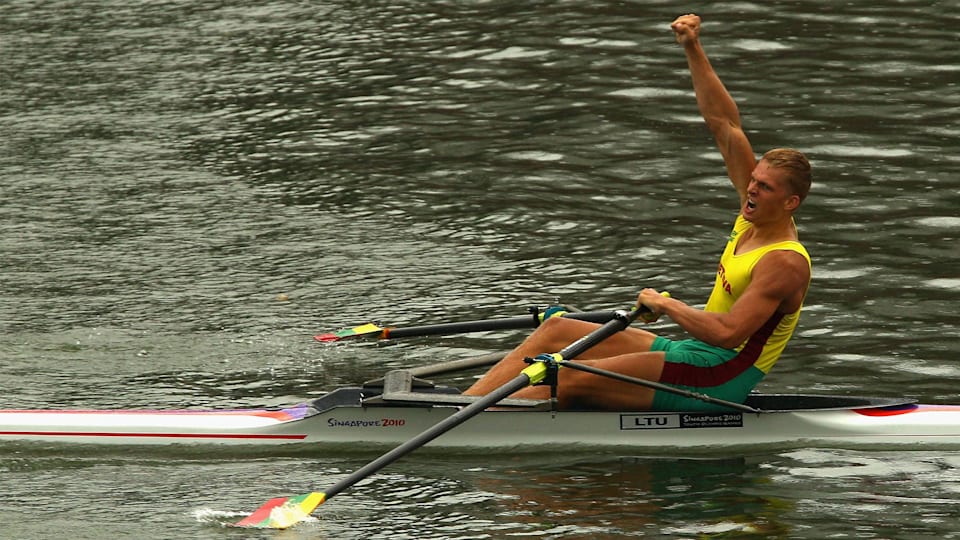#YOGJourney: The long road to Tokyo for Rolandas Mascinskas
Lithuanian rower and 2010 Youth Olympic champion Rolandas Mascinskas came of age last year, winning a first world title as part of his country’s men’s quadruple sculls team. Now, having missed the previous Games through injury, the 26-year-old has his sights set on an Olympic medal at Tokyo 2020.

At the inaugural Youth Olympic Games (YOG) in Singapore in 2010, a strapping 18-year-old rower called Rolandas Mascinskas marked himself out as a serious athlete to follow, with a dominant victory in the single sculls competition at Marina Reservoir.
Little more than a year later, Mascinskas became European champion in double sculls, marking the start of a highly successful partnership with Saulius Ritter, which saw the pair reach the 2012 Olympic final and claim silver at the 2013 and 2015 World Championships.
An Olympic medal beckoned at Rio 2016 but, three weeks before the Games, disaster struck as Mascinskas suffered a fractured hand when falling off his bike – and watched from home as Ritter won a silver medal alongside Mascinskas’ replacement, Mindaugas Griskonis.
Since then, Mascinskas has channelled his frustration in a positive way, stepping up to the quadruple sculls and winning a first world title in Florida. Speaking before he added another medal to his growing collection – this time a silver at the European Championships in Glasgow – the 26-year-old told us how success in Tokyo would cap a remarkable #YOGJourney…
How would you describe your first Olympic experience in Singapore in 2010?
“The YOG Singapore 2010 were my first international competition, and a big event in my life. When I qualified a year earlier it was in the pairs event, but my partner was too old, so I changed to the singles – and I was extremely happy when I won! Singapore is an incredible city and I had an incredible result.”
What do you remember about the Youth Olympic Village and everything that was happening out of the water?
“In Singapore, the Youth Olympic Village was really geared towards the athletes. There were around 15 of us from Lithuania; we had everything we needed; and we could decide what to do with our free time. Before the start of my event, I was concentrating on my training, food and rest. But after my competition finished, my team went out in the city to experience the culture and the people. Now, whenever I go to competitions, I always like to explore if I have time.”
How has winning the Youth Olympic title helped your career?
“As a young athlete [aged 18], it really helped me progress to the next level. Winning the gold medal gave me a lot of motivation to take my next steps, and one year later I qualified for London 2012 in the double sculls. Since the YOG, there has been a lot of training and a lot of discipline – every day you need to repeat some of the same things. But if you do this, and you set yourself a target, then you can move forward and get the results.”
What is your training routine like?
“We move around different camps for training. In the winter we go to Italy; in the spring we go to Greece; and then we come back to Lithuania in the summer – for the good weather! If you train alone, it is hard to achieve good results. But if you are strong and you have strong partners, you can do anything. After Rio, the Lithuanian rowers won medals while I was sitting at home. So I’ve worked a lot in the boat, on the bikes, on the ski slopes and on the mental side; and for the last two years, I’ve been very strong.”
Was winning the world title in Florida last year the highlight of your career?
“Absolutely. When I won the YOG title, I was a boy; but last season I became a man. It was a very important step in my growth as an athlete. Now, I am a Youth Olympic champion, a three-time European champion, and a world champion… all I need is a gold medal from the Olympic Games. So this time, I will not be riding my bike for two months before Tokyo 2020!”
Is rowing becoming more popular in Lithuania?
“Since our recent successes, we’ve seen more and more children in Lithuania coming on the water to learn, and to compete in youth competitions. At the YOG Buenos Aires 2018, we have one team – the women’s pair [Vytaute Urbonaite and Kamile Kralikaite] – who have qualified in rowing, and I think they can achieve very good results. The whole senior Lithuanian rowing team will be watching their races!”
What advice would you give to the young athletes to make the most of their YOG experience in Buenos Aires?
“For all the young athletes, I can say that the YOG are a very important step to the next stage of your career. So in Buenos Aires, concentrate on your event first, and then enjoy the free time. Argentina is an incredible country and you should look around the host city if you have the opportunity. Good luck!”
